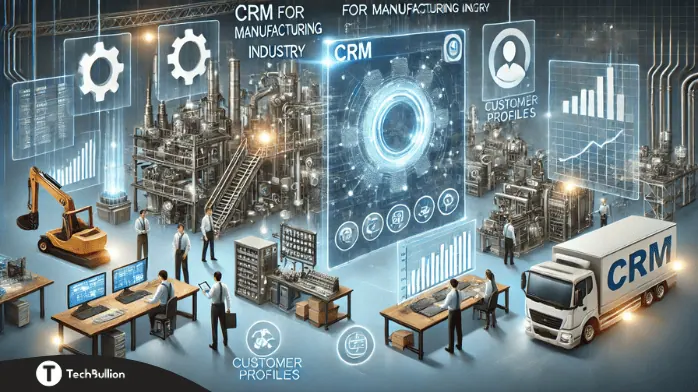
In the ever-evolving world of manufacturing, businesses are under constant pressure to optimize operations, enhance customer satisfaction, and maintain a competitive edge. One of the most effective tools to achieve these objectives is a Customer Relationship Management (CRM) system tailored for the manufacturing industry. This article delves into the intricacies of CRM for manufacturing industry, exploring its benefits, features, implementation strategies, and future trends.
What is CRM for Manufacturing Industry?
At its core, CRM (Customer Relationship Management) is a technology-driven solution designed to manage and improve customer relationships. However, CRM for manufacturing industry goes beyond traditional customer management by addressing unique needs such as supply chain coordination, production scheduling, and vendor interactions.
These systems enable manufacturers to streamline workflows, centralize customer and operational data, and foster better communication across all touchpoints, from suppliers to end customers.
Importance of CRM in Manufacturing Industry
In manufacturing, where precision, timely delivery, and efficiency are critical, a CRM system is not a luxury but a necessity. Here’s why:
- Improved Customer Retention
By tracking customer preferences, purchase history, and feedback, manufacturers can deliver personalized experiences that build loyalty. - Enhanced Sales Performance
CRM provides actionable insights into customer behavior, helping sales teams close deals faster and more effectively. - Streamlined Operations
Integration with other systems like ERP ensures seamless order management, inventory tracking, and production scheduling. - Better Forecasting
Advanced analytics allow manufacturers to predict market trends, optimize production, and reduce waste. - Increased Collaboration
By centralizing data, CRM fosters better collaboration between departments, ensuring everyone works towards common goals.
Key Features of CRM for Manufacturing Industry
A robust CRM for manufacturing companies should offer features tailored to industry-specific needs:
- Lead and Opportunity Management
Track prospects, monitor their journey, and convert them into loyal customers. - Order Management
Manage customer orders efficiently, ensuring accurate tracking from placement to delivery. - Inventory Integration
Sync CRM with inventory systems to maintain optimal stock levels and avoid shortages or overstocking. - Supplier and Vendor Management
Maintain strong relationships with suppliers by managing communications and tracking performance. - Data Analytics and Reporting
Gain insights into sales trends, customer preferences, and operational bottlenecks through advanced reporting tools. - After-Sales Support
Provide timely support, track customer complaints, and improve satisfaction post-purchase. - Mobile Accessibility
Access CRM data on-the-go, empowering teams to stay productive from anywhere.
Benefits of CRM for Manufacturing Companies
Implementing a CRM system in the manufacturing industry comes with a plethora of advantages:
1. Increased Productivity
CRM automates repetitive tasks like data entry, lead tracking, and order updates, allowing employees to focus on strategic activities.
2. Enhanced Customer Experiences
With detailed insights into customer preferences and history, businesses can offer personalized service, building trust and loyalty.
3. Cost Savings
Automation and better resource planning reduce waste and operational costs, making processes more efficient.
4. Scalability
As your business grows, CRM scales with you, accommodating increased customer data, orders, and operational complexities.
5. Real-Time Insights
Access to real-time data ensures quick decision-making, from production adjustments to sales strategies.
Top CRM Software for Manufacturing Industry
Choosing the best CRM for manufacturing companies depends on specific business needs. Here are some of the leading options:
- Salesforce Manufacturing Cloud
Tailored for manufacturers, it offers powerful tools for sales, operations, and analytics. - Zoho CRM
A cost-effective solution with robust automation and customization capabilities. - Microsoft Dynamics 365
Combines ERP and CRM functionalities, providing an all-in-one solution for manufacturers. - HubSpot CRM
Known for its user-friendly interface and integration capabilities. - SugarCRM
Offers advanced customization options to meet unique manufacturing requirements.
Implementation Strategies for CRM in Manufacturing Industry
To reap the full benefits of CRM, manufacturers must adopt a strategic approach:
- Define Objectives
Identify specific challenges the CRM will address, such as improving order accuracy or enhancing customer retention. - Engage Stakeholders
Involve teams from sales, operations, and IT to ensure the system meets cross-departmental needs. - Choose the Right Vendor
Evaluate software providers based on features, scalability, and customer support. - Data Migration
Plan a secure and accurate transfer of existing data into the new system. - Employee Training
Equip employees with the skills to use the CRM effectively through training sessions. - Monitor Performance
Regularly assess the CRM’s impact on business objectives and make necessary adjustments.
Challenges in Implementing CRM for Manufacturing Companies
While the benefits are clear, adopting a CRM system in manufacturing isn’t without challenges:
- Resistance to Change
Employees may resist new technologies, requiring training and change management strategies. - High Initial Costs
Advanced CRM systems can be expensive, making them a significant investment for small manufacturers. - Data Security Concerns
Protecting sensitive customer and operational data is critical in the digital era. - Integration Issues
Ensuring seamless compatibility with existing systems like ERP can be complex.
Future Trends in CRM for Manufacturing Industry
As technology evolves, so does the potential of CRM systems in the manufacturing industry:
- AI and Machine Learning
AI-powered CRMs will offer predictive analytics, helping manufacturers anticipate customer needs and market trends. - IoT Integration
Connecting IoT devices to CRM systems will enable real-time monitoring of equipment and production lines. - Cloud-Based Solutions
Cloud CRMs will dominate due to their flexibility, scalability, and lower infrastructure costs. - Enhanced Mobile Apps
Mobile CRM applications will empower teams to access and update data from anywhere.
Use Cases of CRM in Manufacturing
- Order Tracking
Automate the tracking process to ensure timely deliveries and satisfied customers. - Customer Segmentation
Group customers based on purchase history and preferences for targeted marketing. - Sales Forecasting
Use data insights to predict future sales trends and align production schedules. - Supplier Collaboration
Streamline communication with suppliers, ensuring timely procurement of raw materials. - Post-Sale Support
Track and resolve customer complaints efficiently, improving satisfaction and loyalty.
Conclusion
CRM for manufacturing industry is no longer a luxury but a necessity in today’s competitive landscape. From streamlining operations to enhancing customer relationships, CRM systems empower manufacturers to achieve greater efficiency, scalability, and profitability. By selecting the right CRM solution and implementing it strategically, businesses can unlock new opportunities, overcome challenges, and drive long-term success.
Invest in a robust CRM system today and position your manufacturing business for a thriving future.







